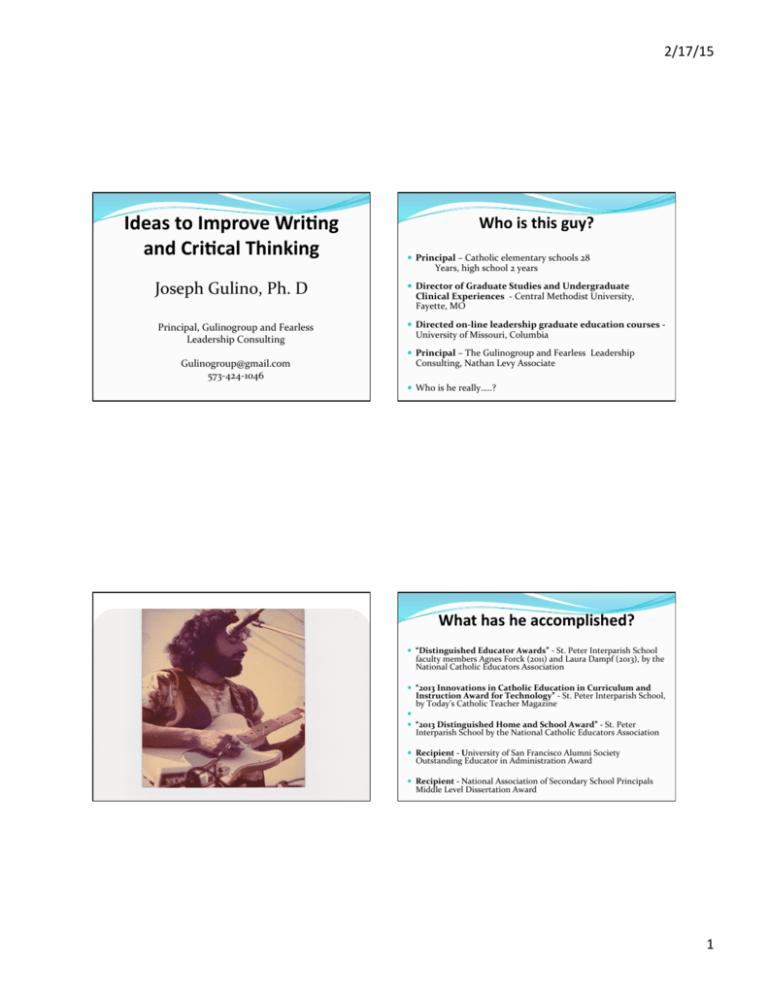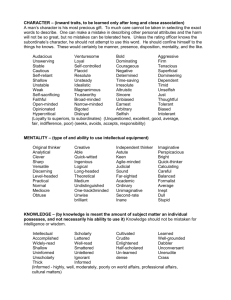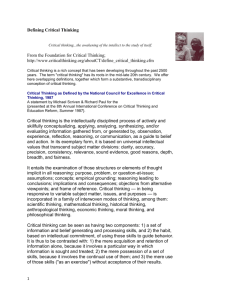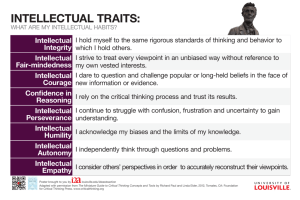Gulino, Joseph_Ideas to Improve Writing and Critical Thinking 1.pptx
advertisement

2/17/15 Ideas to Improve Wri/ng and Cri/cal Thinking Who is this guy? ! Principal – Catholic elementary schools 28 Years, high school 2 years Joseph Gulino, Ph. D Principal, Gulinogroup and Fearless Leadership Consulting Gulinogroup@gmail.com 573-­‐424-­‐1046 ! Director of Graduate Studies and Undergraduate Clinical Experiences -­‐ Central Methodist University, Fayette, MO ! Directed on-­‐line leadership graduate education courses -­‐ University of Missouri, Columbia ! Principal – The Gulinogroup and Fearless Leadership Consulting, Nathan Levy Associate ! Who is he really…..? What has he accomplished? ! “Distinguished Educator Awards” -­‐ St. Peter Interparish School faculty members Agnes Forck (2011) and Laura Dampf (2013), by the National Catholic Educators Association ! “2013 Innovations in Catholic Education in Curriculum and Instruction Award for Technology” -­‐ St. Peter Interparish School, by Today’s Catholic Teacher Magazine ! ! “2013 Distinguished Home and School Award” -­‐ St. Peter Interparish School by the National Catholic Educators Association ! Recipient -­‐ University of San Francisco Alumni Society Outstanding Educator in Administration Award ! Recipient -­‐ National Association of Secondary School Principals Middle Level Dissertation Award 1 2/17/15 Is He published? ! “Principles of Fearless Leadership,” -­‐ Nathan Levy Books, 2012 In Depth Areas of Knowledge – My Passions ! “Church and State: Partners for the Common Good,” -­‐ Missouri Catholic Conference, MESSENGER, Jan. 2012 ! “Advisors to the Principal,” -­‐ Today’s Catholic Teacher, August/September 2011 ! Principles of Leadership ! “How young is too young?”-­‐ Jefferson City Magazine, September/October 2008 ! Kindergarten Readiness ! “Kindergarten Readiness: A Challenge,” -­‐ NAESP Magazine, May/June 2008 ! Excellence in Teaching ! “Middle School Programmatic Practices and Student Satisfaction With ! Leading very successful schools ! “To Brave Ulysses,” -­‐ America at the Millennium a publication by The International ! Empowering others ! “Teacher Supervision: Use the Laptop,” -­‐ Missouri Educational Leadership, 1998 ! Proper education for each and every student (Needs) School,” -­‐ NASSP Bulletin, Sept. 1999 Library of Poetry, 1999 ! "My New Life," -­‐ A Song for children with disabilities, Middle School Journal Par/cipants Goals For the Future ! Share my experiences and provide ‘food for thought.’ ! Facilitate you sharing your experiences with each other ! Share and provide resources (or someone must) from people in whom I believe, so that educators and parents do not have to search too far or try/have to reinvent wheels. ! (The mistakes of new leaders who take over schools or roles) ! If interested in taking time to review resources, stop by the ! New bees ! Old Pros ! Desire New Information ! Review Past Information ! Practical Tips ! Standby Resources ! New Resources table 2 2/17/15 Vocabulary is a huge key 1 Not the expert, but provide my experiences, resources and research Please join in and be an active participant where comfortable for you E-­‐mail me if… Voc ! Thinker’s guide to critical thinking ! http://www.criticalthinking.org/files/ SAM_Aspiring_Thinkers_GuideOPT.pdf ! Resources The redesigned SAT https://www.collegeboard.org/delivering-­‐opportunity/sat/redesign ! Develop strong reading and writing skills ! http://www.scholastic.com/browse/article.jsp?id=8100 ! Strategies for vocabulary development ! http://www.phschool.com/eteach/language_arts/2002_03/ essay.html What are you/we trying to do? ! I Promote Critical thinking ! CT -­‐ A way of deciding whether a claim is true, partially true, Strengthen word recognition, vocabulary, and writing http://www.inspiration.com/Kidspiration or false ! CT -­‐ A process that leads to skills that can be learned, mastered and used The importance of and how to build vocabulary http://www.artofmanliness.com/2012/10/03/the-­‐ importance-­‐of-­‐building-­‐your-­‐vocabulary-­‐and-­‐5-­‐easy-­‐ steps-­‐to-­‐doing-­‐it/ ! CT -­‐ A tool by which one can come about reasoned conclusions based on a reasoned process ! CT -­‐ Incorporates passion and creativity, but guides it with discipline, practicality and common sense 3 2/17/15 Basics Basic Educator Prac/ces to Improve CT ! Beginning of lesson -­‐ Promote active listening by letting them know you will ask for someone to ‘summarize’ ! Your behaviors, ‘Withhold Judgment’ – Your face, words, etc. ! ‘Survey Class’ – How many agree ! Cue Student Responses – “Not a single answer to this question. Consider alternatives.” ! Call on students Randomly – (not raised hands) ! Question , then ‘Think-­‐Pair-­‐Share’ – 2 min. alone/pair, open discussion ! Question, then ‘Wait Time’ – 10/20 seconds ! II Provide experiences for students -­‐ consider basic human needs and CT needs ! ‘Student Calling’ – On each other ! ‘Devil’s Advocate’ – Defend their reasoning against another’s point of view ! ‘Unpack Thinking’ – Described how arrived at answer ! ‘Student Questioning’ – They develop own questions… (used in the assessment?) ! III Encourage Divergent Thinking ! A thought process or method used to generate creative ideas by exploring many possible solutions. ! Have students -­‐ express themselves critically and ! Often used in conjunction with convergent thinking, which ! Provide relevant subject matter to write about. “Write a ! Divergent thinking typically occurs in a spontaneous, free-­‐ creatively arising from their experiences of the world paragraph about…?” just does not get it follows a particular set of logical steps to arrive at one solution, which in some cases is a "correct" solution flowing manner ! ! Students must practice and have -­‐ control of basic writing ! skills, i.e. sentence structure, paragraphing, etc. ! Many ideas are generated in an emergent cognitive fashion Many possible solutions are explored in a short amount of time, and unexpected connections are drawn After the process of divergent thinking has been completed, ideas and information are organized and structured using convergent thinking 4 2/17/15 Cri/cal Thinking in Everyday Life: 9 Strategies -­‐ Paul, R. & Elder, L. ! IV Increase cognitive skills of resolving discrepancies through successful experiences ! Developing critical thinkers -­‐ a gradual process requiring work -­‐ a long-­‐range project V Provide experiences that display the enjoyment and positives of working cooperatively rather than competitively to solve a common problem ! -­‐ What my son experiences… ! Stages for development ! Stage One: The Unreflective Thinker -­‐ unaware of significant problems in our ! ! VI Provide for growth in imagination and intuitive function ! ! ! VII Provide a change-­‐of-­‐pace from task-­‐oriented learning ! 9 Strategies Used to Develop Cri/cal Thinkers Areas of education, along with leadership, that are not addressed enough thinking ! ! Stage Two: The Challenged Thinker -­‐ become aware of problems in our thinking Stage Three: The Beginning Thinker -­‐ improve but without regular practice Stage Four: The Practicing Thinker -­‐ recognize the need to regularly practice Stage Five: The Advanced Thinker -­‐ advance in accordance with our practice Stage Six: The Master Thinker -­‐ skilled & insightful thinking become second nature Strat Implementing the Strategies ! No one of the 9 strategies is essential ! 1. Use “Wasted” Time ! ! Each strategy presents a way to begin to do something to improve ! ! Never practice too much of all of them at the same time, but experiment 2. A Problem A Day 3. Internalize Intellectual Standards ! ! ! ! ! ! 4. Keep An Intellectual Journal 5. Reshape Character 6. Deal with Ego 7. Redefine the Way Things Seen 8. Get in touch with emotions 9. Analyze group influences on life with all over an extended period of time ! Students develop if they: ! 1) accept the fact that there are challenges to their thinking and, 2) they begin regular practice, which teachers and parents can promote ! If you already know of all of the strategies, do you practice them? 5 2/17/15 1 -­‐ Use “Wasted” Time ! All humans, at times (too many and too much) Strat CT – An evening writing assignment ! At the end of class/the day – ! Have students ask themselves, then write, and spell out details and be explicit in what they recognize and feel, about questions like these: Fail to use all of their time productively or even pleasurably Jump from one diversion to another, without enjoying any of them (celebrate successes) ! Become irritated about matters beyond our control ! Fail to plan well causing us negative consequences we could easily have avoided ! Worry unproductively ! Spend time regretting what is past ! Just stare off blankly into space 2 -­‐ A Problem A Day (Week) ! Develop problems -­‐ for students to work on/through and direct these steps to teach the process ! Identifying their elements – have students systematically think through the questions ! What exactly is the problem? ! How can it be put it into the form of a question? ! 1) Study -­‐ make clear the “kind” of problem dealing with ! What sorts of things you are going to have to do to solve it.? ! 2) Distinguish problems -­‐ over which you have some control from problems over which you have no control ! Set aside the problems over which you have no control, concentrating your efforts on those problems you can potentially solve ! When did I do my worst thinking today? ! When did I do my best? ! What in fact did I think about today? ! Did I figure anything out? ! Did I allow any negative thinking to frustrate me unnecessarily? ! If I had to repeat today what would I do differently? Why? ! Did I do anything today to further my long-­‐term goals? ! Did I act in accordance with my own expressed values? 5) Figure out -­‐ options for action What can be done in the short term? In the long term? Distinguish problems under control from problems beyond control Recognize explicitly limitations as far as money, time, and power 6) Evaluate options -­‐ taking into account their advantages and disadvantages in the situation 7) Adopt a strategic approach -­‐ to the problem and follow through on that strategy This may involve direct action or a carefully thought-­‐through wait-­‐and-­‐see strategy 8) When time to act -­‐ monitor the implications of actions as they begin to emerge Be ready at a moment’s notice to revise strategy if the situation requires it Be prepared to shift strategy or analysis or statement of the problem, or all three, as more information about the problem becomes available 3) Figure out -­‐ the information needed and actively seek that information 4) Carefully analyze and interpret -­‐ the information to collect, drawing reasonable inferences 6 2/17/15 3 -­‐ Internalizing Intellectual Standards You ! Is there a problem solving practice that you would like to share with us? ! Write about Internalizing Intellectual Standards each week (or over time) –develop awareness of intellectual standards of: ! clarity, precision, accuracy, relevance, depth, breadth, logicalness, significance ! Ex. -­‐ students try to notice when being unclear in communicating and notice when others are unclear in what they are saying. ! When reading, notice whether clear about what reading ! When orally expressing or writing out views (for whatever reason), ask whether they are clear about what trying to say focusing on four techniques of clarification 1) Stating what saying explicitly and precisely (with careful consideration given to choice of words) 2) Elaborating on meaning in other words 4 -­‐ Keep An Intellectual Journal ! Write out a certain number of journal entries. Use following format (keeping each numbered stage separate): ! 1. Situation -­‐ Describe a situation that is, or was, emotionally significant (deeply cared about). Focus on one situation at a time 2. Response -­‐ Describe what done in response to that situation. Be specific and exact 3. Analysis -­‐ Analyze, in the light of what was written, what precisely was going on in the situation. Dig beneath the surface 4. Assessment -­‐ Assess the implications of analysis ! What was learned about self? ! What would be done differently if situation could be re-­‐lived? ! 3) Giving examples of what mean from experiences ! 4) Use analogies, metaphors, pictures, or diagrams to illustrate what they mean. Frequently STATE, ELABORATE, ILLUSTRATE, AND EXEMPLIFY points. 5 -­‐ Reshape Your Character ! Choose one intellectual trait-­‐-­‐-­‐ ! perseverance, autonomy, empathy, courage, humility, etc.-­‐-­‐-­‐ to strive for each month and focus developing that trait Ex. -­‐ Intellectual humility -­‐ begin to notice when you are … ! admitting wrong ! refusing to admit wrong, even in the face of glaring evidence wrong ! becoming defensive when another person tries to point out a deficiency, or thinking ! intellectual arrogance (keeps from learning) – Ex. -­‐ thinking already know everything needed to know about a subject, or know as much as someone else does -­‐ “Who does that person think he/she is forcing opinions on me?” ! By owning “ignorance,” it can begin to be dealt with 7 2/17/15 6 -­‐ Deal with Egocentrism ! Egocentric thinking – subconscious bias in favor of oneself ! On a daily basis -­‐ contemplate questions like: ! Under what circumstances … – Do You think with a bias in favor of self? ! Ever … ! ! ! Become irritable over small things? Say anything “irrational” to get way? Try to impose will upon others? Fail to speak mind when felt strongly about something, and then later feel resentment? 7 -­‐ Redefine the Way See Things ! Every situation is ‘defined’, given a meaning. ! How a situation is defined -­‐ how feel about it, also how acted on it, and implications it has ! Virtually every situation can be defined in more than one way. ! Many negative definitions – could be made positive ones. (Happy when otherwise would have been sad or fulfilled when otherwise frustrated. ) ! Practice redefining – negatives/positives, dead-­‐ends new beginnings, mistakes/opportunities -­‐ Helias ! Create guidelines. Ex. -­‐ list of five -­‐ ten recurrent negative contexts in which we feel frustrated, angry, unhappy, or worried ! Identify the definition in each case that is at the root of the negative emotion ! Identify egocentric thinking -­‐ work to replace it with systematic self-­‐reflection: ! What would a rational person feel in this or that situation? ! What would a rational person do? ! How does that compare with what want to do? ! (Hint: If find continually concluding that a rational person would behave the same as you all ! Choose a plausible alternative definition for each and then plan for our new responses as well as new emotions ! Ex., if tend to worry about all problems, both the ones you can do something about and those that you can’t; you can review the thinking in this nursery rhyme: “For every problem under the sun, there is a solution or there is none. If there be one, think until you find it. If there be none, then never mind it.” the time, probably engaging in self-­‐deception.) 8 -­‐ Get in Touch with Emo/ons ! Whenever feel some negative emotion, systematically ask yourself: ! What, exactly, is the thinking leading to this emotion? ! Ex., if angry, ask, what is the thinking that is making (your name) angry? ! What other ways could (your name) think about this situation? ! Ex., Can see the humor in it and what is pitiable in it? If can, concentrate on that thinking and emotions will (eventually) shift to match it 9 -­‐ Analyze Group Influences on Life ! Analyze the behavior that is encouraged, and discouraged, in the groups in which belong ! What "required" to believe? ! What “forbidden" to do? ! Every group enforces some level of conformity ! Most people live much too much within the view of themselves projected by others (early teens) ! Discover pressure bowing to and think explicitly about whether or not to reject that pressure 8 2/17/15 Conclusion ! The key point to keep in mind when working with these You ! What do you do to Develop Writing and Critical Thinking? strategies is that you are experimenting, testing these ideas in everyday life ! You are trying to integrate them, and build on them, in the light of student actual experiences Please share ! Be flexible and go with the flow at times ! Ex. -­‐ Working on “Redefining the Way You See Things,” Hopefully students find themselves noticing the social definitions that rule many situations in their lives. They may recognize how their behavior is shaped and controlled by the definitions they use Think The Leadership Void… ‘Thinkology’ ! If students special with special gifts… Newest Resource by Nathan Levy “Engaging Activities to enhance the Creative Mind” Thinking and Writing from Crib to College Pg. 51-­‐52 ! Then, expect movers, shakers and leaders ! So, most important must experience and practice quality leadership principles ! “We all need a voice of reliable perspective. We need it from loved ones in our lives. We need it from our colleagues. We need it from our school. .. And for the sake of others, we need to cultivate it within ourselves. ! David Wilson, Asst. Principal, Jefferson City High School 9 2/17/15 ‘Principles of Fearless Leadership’ ! Thinking and Writing Think Activities for the Brain ! Ywriteabook? ! Use to improve critical thinking and writing ! What I would do… portfolio ! Sand & stone – pg. 6 ! Seat of pants – pg. 18 ! Whining – pg. 30 ! Know each other – pg. 36 ! Because I said so! – pg. 40 ! Sails – pg. 64 ! Blood is thicker than policies Crea/ve Wri/ng Resources ‘Write from the Beginning’ for younger students. ! Books 1 & 2 ! “Open Minds and Encourage Creative Thinking” ! The notable quotes and activities to connect to your curriculum Activities -­‐ developed to promote interesting critical writing Pgs. 52-­‐3, 84-­‐85 ! ‘Not Just Schoolwork’ – Middle and H.S. Students ! Children in lower grades -­‐ have much to say Many formats -­‐ traditionally limited and focus on simple topics Pick any page – They focus on the many possibilities of creative writing. ! I Perceptions of world ! Examples ! Perceiving through senses – pg. 5 II Law and Order – pg. 59 ! Perceiving self -­‐ pg. 29 III My Pet Monster – pg. 65 ! Perceiving others – pg. 67 IV Tis the Season -­‐ pg.89 ! Perceiving ideas – pg. 81 I Win or Lose – pg. 36 10 2/17/15 Affec/ve Cogni/ve Thinking – ‘Thinking Strategies for the Gijed’ Strat ! II Creative Story Writing – 104 ! III Other Units of Resources – Spell and Write, Writing the News, Holidays, Moods, Science Fiction, Music ! IV Tools of the Trade – Help for students and ! ! teachers ! Literature ! Fairy tales/not. Return to reading them to students and having them read them as well. ‘Nathan Levy’s A.C.T. I’ Stress advanced conceptualization of interpretation, The Other Word – Find and share words that mean the same thing (Proper dictionary or thesaurus) translation, application, analysis, synthesis, and evaluation Feeling Checklist – Appropriate specific list of words to use when writing ! ! ! ! Eleanor Rigby – Answer questions re: the story of the song, ex. “How does loneliness differ from being alone?” ! Ex. -­‐ Hansel and -­‐ pg. 13 Science – Living things Earth and beyond Machines, Ideas and Inventions Strat ‘Stories with Holes’ – ‘Whose Clues’ ! Inquiry & critical thinking ! New to You?? ! The first introduction… ! “I am going to tell you a story with a hole in it – an ! All participate promoting group & individual success ! May adjust to fit ages or needs important part will be missing. Listen carefully and figure out the missing part. The story might not make sense to you at first….” ! Make sure that students know this is not about quick or ! Length of time varies to ability of the group ! Open or close -­‐ Change of pace -­‐ decrease down time guessing, but about figuring, thinking, maybe sharing, and being correct. ! Tell the story once, pause, and then tell it again very slowly 11 2/17/15 Strat Encourage Ar/s/c Development and Understanding ! The rules to share with students… ! You can only ask questions that can be answered with a ‘yes’ or a ‘no’. The only answers I can give you are “Yes, No, Does Not Compute (meaning, I cannot just use a Yes or No without confusing you), or Is Not Relevant.” Let them know that “Does Not Compute and It is Not Relevant” are stated so as not to confuse them. ! You the director) will not be perfect and make mistakes, so just laugh with them ! Students who are aware of and appreciate fine arts are at the advantage of others, as they will be considered more well-­‐ rounded because of that knowledge. (And they will be!) ‘Artistry’ ! You may allow for questions the first time if you choose, but not ! Table of Contents – pg. 3 necessary ! You only answer in the ways stated ! Impressionism – pg. 103 ! Art Art ! Impressionism ! Background -­‐ 2 page description of impressionism ! Print of Monet’s Sunrise ! Short paragraph review of impressionists ! Options for students ! Students paint still lives in the way impressionists did ! Research and find a photo they like and reproduce it using impressionist techniques ! Challenging – reinterpret, such as a night scene of van Gogh’s Starry Night. They find image (internet/magazines) or take own photo and reproduce it using impressionist techniques ! Impressionism ! Extension I – View some reproductions, pick favorite, Who is it by? When done? What title? Etc. ! France is famous for what else? Draw map of France. ! Difficulties of an artist working indoors, advantages, etc. Extension II – Write about the difficulties of painting indoors. Advantages. Where would you prefer to work and why? ! What was going on in France around 1860-­‐80? Research and report. ! Pick a country and research and report about their time 1850-­‐90 12 2/17/15 New to ‘Gijed Educa/on’? Esp. a Parent Closure ! Thank you ! Learn as much as you can from anyone you can learn ! One idea – Blossoms ! Our resources… ! If can be of help from ! ‘What to Do When Your Kid is Smarter Than You?’ ! ‘Chuckie and Other Gifted Children’ Ideas to Improve Wri/ng and Cri/cal Thinking ! Joseph Gulino, Ph. D Principal, Gulinogroup and Fearless Leadership Consulting Gulinogroup@gmail.com 573-­‐424-­‐1046 13







